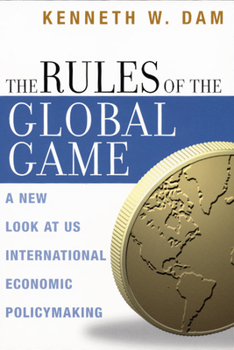The Rules of the Global Game: A New Look at US International Economic Policymaking
Select Format
Select Condition 
Book Overview
Economic news once confined to the business pages of the newspapers now receives headline coverage, whether it involves protests in Seattle or sweatshops in Asia. As attention is increasingly focused on economic policy, it becomes even more important for noneconomists to be able to make sense of these stories. Is the Asian economy sinking or rising? What effects will a single European currency have on the US economy? Kenneth W. Dam's The Rules of the Global Game provides, in clear and practical language, a framework to help readers understand and answer such questions. Dam takes us beyond the headlines and inside the decision-making process as it is populated by lobbyists, special interest groups, trade associations, and public relations firms. While some economists and thinkers have idealized plans for US international economic policy, Dam, currently the deputy secretary of the treasury, manages to merge this idealism with a consideration of what it means to govern at the intersection of competing groups with competing claims. In The Rules of the Global Game, Dam first lays out what US international economic policies are and compares them to what they should be based on how they affect US per capita income. With this foundation in place, Dam then develops and applies principles for elucidating the major components of economic policy, such as foreign trade and investment, international monetary and financial systems, and current controversial issues, including intellectual property and immigration. Underlying his explanations is a belief in the importance of worldwide free trade and open markets as well as a crucial understanding of the political forces that shape decision making. Because economic policy is not created in a political vacuum, Dam argues, sound policymaking requires an understanding of "statecraft"-the creation and use of institutions that channel the efforts of interest groups and political forces in directions that encourage good economic outcomes. Dam's vast experience with the politics and practicalities of economic policy translates into a view of policy that is neither academic nor abstract. Rather, Dam shows us how policy is actually made, who makes it, and why, using examples such as GATT, NAFTA, the US-Japan semiconductor agreement, and the Asian financial crisis. A rare book that can be read with pleasure and profit by layperson and economist alike, The Rules of the Global Game allows readers to understand the policies that shape our economy and our lives.
Format:Paperback
Language:English
ISBN:0226134946
ISBN13:9780226134949
Release Date:June 2004
Publisher:University of Chicago Press
Length:341 Pages
Weight:1.10 lbs.
Dimensions:0.8" x 6.2" x 9.0"
Related Subjects
Business Business & Investing Economics Political Science Politics & Social SciencesCustomer Reviews
2 ratings
simply great!
Published by Thriftbooks.com User , 21 years ago
Dam's book is one of the best examinationsof U.S. trade policy that I 've ever read.The book is extremely clear and well writtenand covers in short chapters most of the relevantglobalization issues facing the U.S.The book covers internatonal trade in goodsand services; the effects of interest groupson trade policy, including a detailed descriptionon how interest group politics actually works in washington; fairness in trade; international movements of capital and even cross-border movement of people.It's pragmatic, intuitive, clear and full of evidence.simply great!
Informative and surprisingly pleasurable read
Published by Thriftbooks.com User , 22 years ago
"The Rules of the Global Game" was one of the more informative books I have read in the recent past. Surprisingly, it was also a pleasure to read. I had expected a very dry tome, given the subject of international economic policy. The author, who is now the Assistant Secretary of the Treasury, explains the interest groups involved, the international structures, and the recent history of US international policymaking, covering trade, monetary and fiscal policy, as well as economic aspects of such disparate subjects as intellectual property, labor, and environmental issues. Informed voters should know about these things, especially given how various groups victimize consumers for their private advantage, all the while claiming that they are working for the environment, fairness, downtrodden foreigners, etc. My only criticism is that not everything was explained in as much depth as I would have preferred. But as an intoduction to the subject the book works very well.






